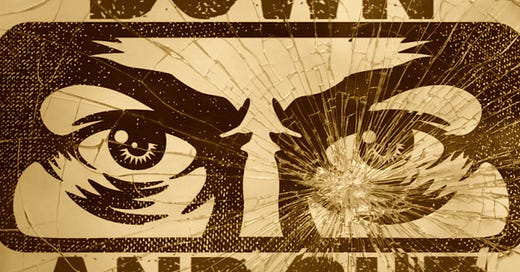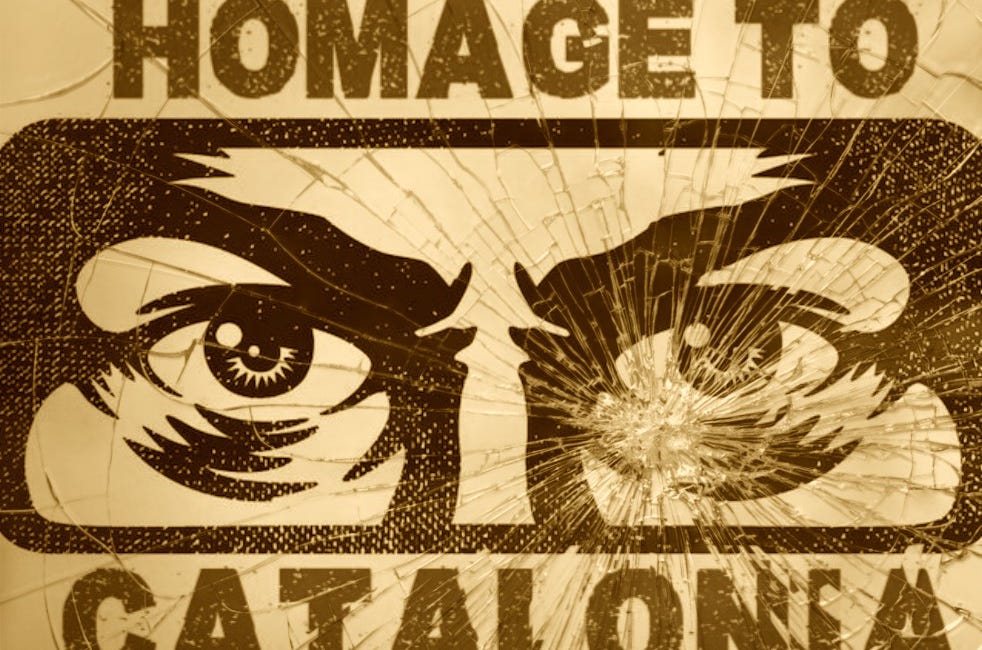This is the fifth chapter of Breaking Big Brother, a book about the life and work of George Orwell. To read from the beginning, click here.
Take a moment and pat yourself on the back—you’ve made it through the boring stuff.1
Eric Arthur Blair is back on the European continent, and he has taken to the streets of Paris and London without a dollar in his pocket to try to make it as a writer.
To clarify, he wasn’t poor. He could’ve gone home to his modest but dignified life and gotten a job doing just about anything. His decision to live amongst the lower classes was an endeavor of investigative journalism, driven by a desire to write about and truly understand poverty.
Going by the name “P.S. Burton,” he spent nights in spikes, temporary shelters which would house a person for a night or two at a time before sending them elsewhere. He befriended professional ‘vagrants,’ nomadic people who spent their days traveling from one spike to another, making a mental map of every place they could get a free meal along the way.
He had a much easier time blending in than one would expect for someone with an Eton-educated accent that outed him as a ‘gentleman’ immediately. He remarked that once a person reached the very bottom rung of the socioeconomic ladder, the playing field was virtually wiped clean. Among ‘tramps,’ traditional markers of social classes basically ceased to have any meaning. No one cared where you were born or how you got there; all that mattered was that you were down on your luck. Blair began this journey as a reaction to the gross inequality he witnessed in Burma. In a way, he got exactly what he wanted.
He picked hops with migrant laborers. He went to Paris and experienced the life of a restaurant ‘plongeur,’ or dishwasher (a brutal occupation with gruelingly long hours, but which at the very least allowed him to afford a cramped, filthy room at a cheap boarding-house). His experiences during this time made their way into a number of his books, most notably Down and Out in Paris and London.
Up to this point, Eric Blair hadn’t published much. He’d written articles for British and French periodicals, he’d published book reviews and even the occasional poem. Some of these articles covered his experience ‘going native’ among the lower classes. He wrote a piece about migrant labor (in fact, he journaled his entire hop-picking experience, which was not published at the time but can now be found in select volumes of Orwell’s collected works). His essay “The Spike” (about, as the title suggests, the spike) was his first piece published in the English language, and I’d highly recommend reading it. By this point he had also begun writing about topics that would remain important to him throughout his career, namely censorship, class struggles, unemployment, and the exploitative nature of imperialism.
However, it was five years after Blair hit the streets in search of writing material before his first book hit the shelves. That book, of course, was Down and Out in Paris and London, a fictionalized account of Blair’s experiences.
The publication of Down and Out was a turning point for a number of reasons. Blair had ended his bout of elective poverty and began a job (which he didn’t enjoy very much) as a teacher at a private high school. Down and Out in Paris and London marked the beginning of his relationship with Victor Gollancz, the owner of the publishing company “The Left Book Club,”which would go on to publish a number of his earlier works. Most notably, though, this was the time when he adopted the alias “George Orwell.”
Although he had published all of his previous articles under the name Eric Blair, his decision to publish Down and Out in Paris and London under a pseudonym was driven by an artistic insecurity that would follow him throughout his writing career. He didn’t think the book was any good, and didn’t want it to be tied to his identity permanently.
Ironically, the name ‘George Orwell’ became just as much a part of his identity as Eric Blair—virtually all friends he made in the latter half of his life referred to him by his pseudonym. Nevertheless, one might argue that he felt more comfortable hiding his true identity behind a mask that he could theoretically take on and off at will.
It’s interesting to think about. The man who we know as George Orwell could have been known to us as something very different. This is perfectly captured in this excerpt from a letter he sent to his literary agent, Leonard Moore, in 1932:
As to a pseudonym, a name I always use when tramping etc is P.S. Burton, but if you don’t think this sounds a probable kind of name, what about
Kenneth Miles,
George Orwell,
H. Lewis Allways.I rather favour George Orwell.
Named after the River Orwell, which Blair loved, he reportedly chose the name because it sounded very “English.” Despite his criticisms of British imperialism and class stratification, he was a patriot (something we will discuss in detail later).
By the time Down and Out was published, he already had another novel in the works: A Clergyman’s Daughter, a semi-autobiographical piece which combined his experiences ‘tramping,’ hop-picking, and teaching. The book is about a young woman who suffers a bout of amnesia, wakes up on the streets of London, and winds up doing all of these things. Although Orwell (predictably) was never satisfied with the book and at one point asked that it not be reprinted after his death, I really enjoyed it.
Of course, the man formerly known as Eric Blair couldn’t settle into ordinary lower-upper-middle-class life for long. He didn’t enjoy teaching. I don’t think he enjoyed doing anything for an extended period of time. In 1936, he ventured into the unknown again. This time, he was sent by his publisher, Victor Gollancz, to report on the unemployed and impoverished in Northern England.
This project eventually became The Road to Wigan Pier. It is arguably one of Orwell’s best works, and it marked the first time he wrote extensively about socialism (his political beliefs had hitherto been closer to anarchism). Wigan Pier solidified Orwell’s reputation as a rebel. The Left Book Club was a socialist publishing company, and Gollancz had commissioned the book with the expectation that it would be favorable to the socialist party. However, the book that Orwell returned with was harshly critical of socialism as it existed in England.
While we previously touched on and will certainly revisit the thematic significance of The Road to Wigan Pier, from a biographical standpoint, his time among the coal miners and the unemployed of Northern England was essentially another example of his unwavering commitment to good journalism.
The next major shift in his life would happen later that same year, when George Orwell traveled to Spain to fight in the Spanish Civil War.
Chapter Six:
Homage to Catalonia
This is Chapter 6 of my book Breaking Big Brother. To read from the beginning, click here.
Sorry, Burmese Days fans. It’s an important book, but you have to admit that this is when Orwell’s story really picks up.






It's odd to think that, had he chosen the pseudonym 'H Lewis Allways' we would be referring to Orwellian things as "Allwaysian". . .doesn't quite sound right does it? Although, there is a certain musicality to the word - like "it's allways gonna be like this". Lol
A Clergyman’s Daughter is one of my favourite books, re-read several times. The characters described in the pages help paint a wonderful picture of British society in the early 1930s.
I feel this gem of a book is sadly underrated, overshadowed by Orwell’s later works and have always felt that A Clergyman’s Daughter would have made a wonderful film